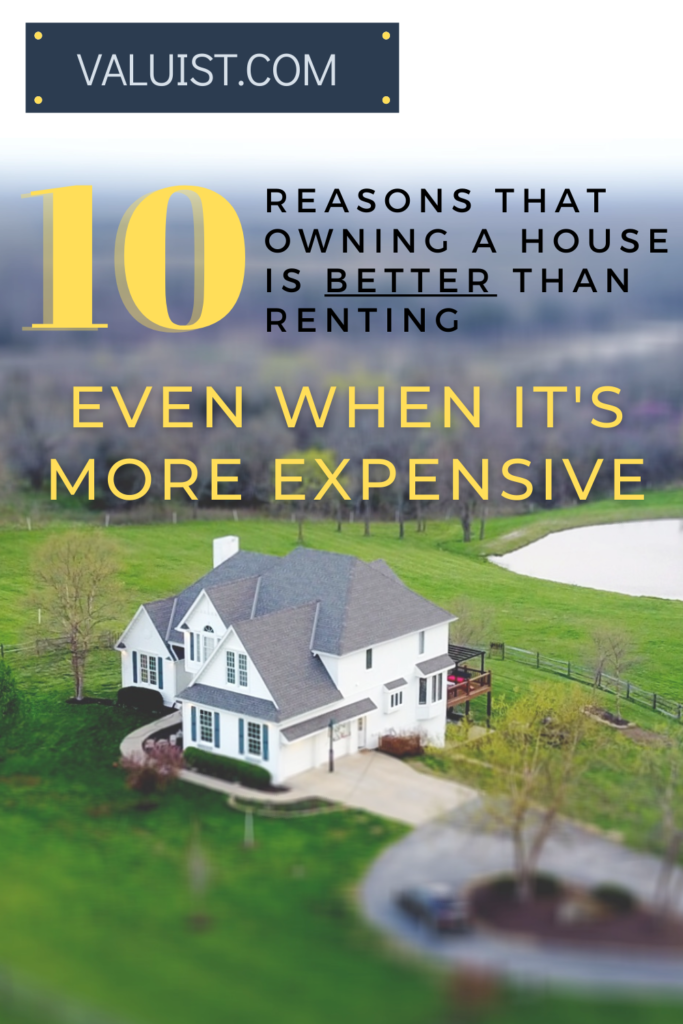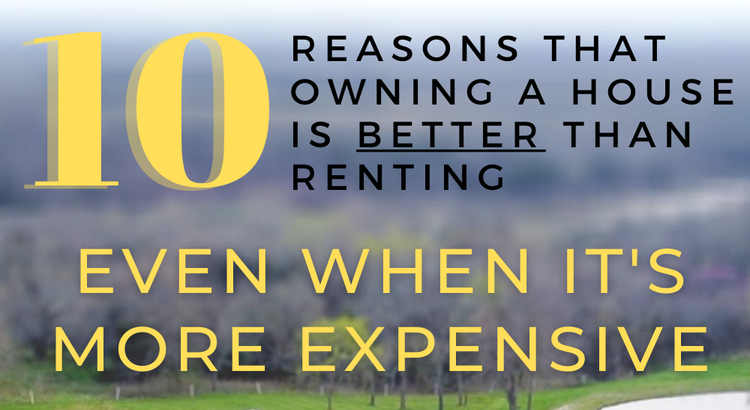Before I bought a house, I wrote an article for Valuist covering the, “True Cost of Buying a Home.” Though that article is still relevant (and a great read too, if I do say so myself), it doesn’t tell the whole story. While it’s true that there are numerous benefits to renting, after buying a house I really can’t imagine going back. Not because owning a house is necessarily more affordable. Where I live in Colorado home ownership is actually often more expensive than renting. The main reason I wouldn’t want to go back to renting is that owning a house is psychologically liberating and, over time, one of the best ways to increase net worth.
Don’t get me wrong, I am aware that I don’t really own anything yet (besides a little equity, anyways). Our original lender sold our note to Wells Fargo, who now owns the majority of our house. It’s also not like I can do whatever I want now that I don’t have a landlord. I live in the suburbs where there are laws, codes, HOAs, covenants and prying eyes, effectively limiting any expressions that get too creative. However, it wasn’t until we bought a house that I really felt like we were home. Maybe that’s just because living in an apartment always felt temporary to me. When you are paying someone else’s mortgage it can feel like you’re on borrowed time.
When renting there are also the strange encounters you will undoubtedly have with landlords, at least once or twice, that you would never have with an institutional lender. One time a landlord demanded that my wife and I meet her 20 miles away to hand-deliver our rent check. She said that rent was due on the first of the month but that we had always paid it on the second or 3rd. I reminded her that our lease agreement only stated, “rents paid after the third day of the month would incur a late fee of $25.00 per day, starting from the first day of the month.” We took this to mean that rent was due by the third but she responded that, actually, rent late fees accrue every day but don’t become payable until after the third, so really we should be paying by the first of the month. Now, I don’t know who wrote that contract but I’m pretty sure it wasn’t an attorney. Clearly, if the late fees don’t become payable until after the 3rd, then, until the 4th, they are imaginary.
There are many other reasons why owning a house is better than renting, here are 10 of my favorites:
1. Equity / Leverage
Unlike with a rental, the most obvious draw to home ownership is the equity you earn and the eventuality that one day you will own your house free and clear. The equity in your home grows both when the value of the property increases and each month as you pay down the principal balance of your loan. Thus, when you are ready to sell, a bigger share of the profits end up in your pockets. This, in turn, makes it easier to make a larger down payment on your next property, or purchase a more expensive property. Following this cycle, you will own the last house you purchase mortgage-free, or live in a big house with big expenses.
The equity you build also provides you with leverage you couldn’t access as a renter. For instance, you can tap into your equity for renovations or even for spending cash, in the form of a home-equity loan. Alternatively, you could rent out your house when you are ready to move and have others pay off your property while you focus on paying for a new house.
2. Privacy
It is very difficult to match the level of privacy you are afforded through home-ownership. In most rentals, at some point you will be heard and likely judged by your neighbors, whether for your singing or your Netflix addiction. You could rent a house and match the level of privacy but house-rentals are rarely as affordable as mortgages.
3. Freedom of Expression
Whether “freedom of expression” refers to your penchant for purple paint or your affinity for Mongolian throat singing, owning a house provides you with the most most opportunities to “do you.” Don’t like way your house is laid out? Remove a wall (if its not load bearing). Want to avoid your neighbors looking into your windows? Plant a tree!
4. The Lawn
This point is more about pride of ownership than the actual lawn, however, in America at least the lawn is the perfect symbol for the responsibilities that come with owning a house. If you don’t water, mow, fertilize and thatch appropriately the lawn will yellow. You just don’t feel that connected to a property when you are renting because its never yours. This is also why rental properties are not typically maintained the way homes are.
5. The Space
This one may not always ring true, especially if you’re renting a house. However, most rental units can’t match the variety spaces that even a smaller house has. Not at anywhere near the same price point, anyways. For instance, in a house you normally have a front porch/lawn area as well as a back porch and lawn or garden, each of which may be designed for separate purposes. You also normally have much more storage via the basement, attic, garage and optional backyard shed.
6. Tax Write-Offs
When you own your home you qualify for additional tax write offs that you couldn’t get if you were renting. The deductions for property tax and mortgage interest are among the biggest benefits but you may also deduct any mortgage points (certain lender fees paid at closing, in exchange for a reduced interest rate) that you assumed in the year the house was purchased. Further, if you do decide to leverage the equity you have built in your house, the interest on HELOCs utilized for capital improvements is tax-deductible, so long as it falls within the home-loan debt limit. For a deeper look, check out this Investopedia article which details this apparent tax “loop hole.”
7. Financial Security
For a significant number of Americans home equity is their only asset with real value. There’s a reason why they call mortgages, “forced savings.” The equity you bank can either be converted into cash for retirement, or, your mortgage payment eventually becomes eliminated which allows you to retire on less income.
However, when you do the math it quickly becomes clear that your home is not usually a good investment. After 30 years you will have paid far more in combined principal and interest than the house was sold, but that doesn’t mean you can’t use your home to improve your financial security. A home can be converted into a rental, fixed-and-flipped or borrowed against. Further, home ownership helps build better credit scores and may provide the owner with better insurance rates and other perks.
8. Safety
With a house that you own, you have a much better ability to control how safe your environment is. Though you still can’t choose your neighbors, you can decide how strong your doors and windows should be, or whether to install a robust, hard-wired security system. Moreover, when you have an awareness who should be on your property, you can better identify potential threats. In an apartment it isn’t possible to keep track of all of your neighbors and their guests. This presents a potential opportunity for unwelcome visitors around your family.
9. More control over utilities and other costs
In any rental situation your are largely locked into your landlord’s decisions regarding utilities and appliances. Some states allow rental companies to charge utility fees based on an average of the buildings total use, applied to each tenant, effectively making your abilities to save energy pointless.
When you own a house you can choose energy efficient appliances or install solar panels to potentially save a lot of money over time. You can even design your entire house with energy efficiency or self-sustainability as the primary focus.
10. The opportunity to pass wealth to your children
An owned home is often much more than just an asset. Homes hold memories which are often significantly more valuable to the homeowner than what the property’s cash-value reflects. However, when a parent dies and leaves behind the family home, it might not make sense for the beneficiaries to hold on to it. Assets usually must be divided among multiple parties, which makes the prospect of selling the home most attractive. For this reason, among others, a huge amount of wealth, in the form of real estate, is willed away. Thus, by making your mortgage payment you are not only working towards your own freedom, but potentially improving the lives of your descendants.


